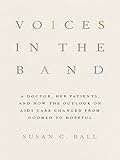 For over twenty years I have been taking care of patients with HIV in New York City, and what a wild ride it’s been — at first sad and disheartening because we lacked effective treatment and so many patients died…to now, a time of hard-won accomplishment because we have the tools to help patients live long and healthy lives. While I used to spend the majority of my working hours in the hospital caring for the sick and dying, today I spend most of my clinical time in an outpatient setting.
For over twenty years I have been taking care of patients with HIV in New York City, and what a wild ride it’s been — at first sad and disheartening because we lacked effective treatment and so many patients died…to now, a time of hard-won accomplishment because we have the tools to help patients live long and healthy lives. While I used to spend the majority of my working hours in the hospital caring for the sick and dying, today I spend most of my clinical time in an outpatient setting.
But first, a little background. I graduated from Dartmouth College in 1981, then earned my medical degree from the Medical College of Pennsylvania in 1985. After my residency in Internal Medicine, I moved to New York and completed a Master’s in Public Health at Columbia University. In 1992, I began working at New York Presbyterian Hospital, then known as The New York Hospital, in the Center for Special Studies, an HIV care center (New York Presbyterian is partnered with the Weill Cornell Medical College). At CSS, all my patients had HIV or its more advanced condition, AIDS.
In those early years, for doctors and lay people alike, HIV and AIDS were foreign territory: unknown, scary, deadly, something to stay away from. To try to combat these stigmas and spread awareness of the disease, I authored a series of articles for over 12 years called The Clinical Challenge for the journal The AIDS Reader, aimed at primary care physicians. In my articles, I wrote about different cases we saw in our clinic or the hospital, and reviewed the literature on similar cases. I tried to enhance the knowledge and understanding of HIV for physicians who might only see one or two patients with the disease. I wanted to make it more approachable and less daunting.
In 1995, after over a decade of ineffective medication and ever-rising numbers of new cases and deaths, treatment finally became available that reversed the course of the disease. Patients previously headed toward the grave instead recovered and did well. Instead of an incurable death sentence, HIV is now considered a chronic, yet treatable, illness. Rarely in all of medicine has a once-fatal disease experienced such a turnaround.


